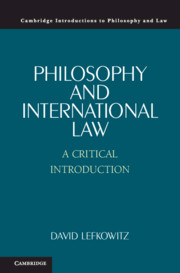Book contents
- Philosophy and International Law
- Cambridge Introductions to Philosophy and Law
- Philosophy and International Law
- Copyright page
- Dedication
- Contents
- 1 Introduction
- 2 John Austin: Enforcement and International Law
- 3 H.L.A. Hart: Social Rules, Officials, and International Law
- 4 Ronald Dworkin: Interpretivism and International Law
- 5 An International Rule of Law?
- 6 The Legitimacy of International Law
- 7 International Human Rights Law: Concepts and Grounds of Human Rights
- 8 The Law of War and Its Relationship to the Morality of War
- 9 International Criminal Law: Crimes Against Humanity and Universal Jurisdiction
- 10 International Law and Secession
- 11 International Trade Law: Free Trade, Fair Trade, and Trade in Stolen Goods
- Bibliography
- Index
5 - An International Rule of Law?
Published online by Cambridge University Press: 10 October 2020
- Philosophy and International Law
- Cambridge Introductions to Philosophy and Law
- Philosophy and International Law
- Copyright page
- Dedication
- Contents
- 1 Introduction
- 2 John Austin: Enforcement and International Law
- 3 H.L.A. Hart: Social Rules, Officials, and International Law
- 4 Ronald Dworkin: Interpretivism and International Law
- 5 An International Rule of Law?
- 6 The Legitimacy of International Law
- 7 International Human Rights Law: Concepts and Grounds of Human Rights
- 8 The Law of War and Its Relationship to the Morality of War
- 9 International Criminal Law: Crimes Against Humanity and Universal Jurisdiction
- 10 International Law and Secession
- 11 International Trade Law: Free Trade, Fair Trade, and Trade in Stolen Goods
- Bibliography
- Index
Summary
This chapter considers the extent to which the (so-called) international legal order provides an example of government in accordance with the rule of law.It begins in the first two sections with a discussion of the elements that comprise that ideal, before turning in the third section to competing accounts of its value; that is, explanations of what makes government in accordance with the rule of law (morally) superior to other forms of rule. The chapter concludes with a somewhat pessimistic assessment of the degree to which the international legal order exhibits fidelity to the ideal of the rule of law.
Keywords
- Type
- Chapter
- Information
- Philosophy and International LawA Critical Introduction, pp. 73 - 97Publisher: Cambridge University PressPrint publication year: 2020

